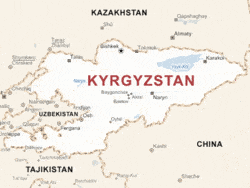The ex-Soviet country of Kyrgyzstan looks to be following squarely in the footsteps of Russia in its treatment of gays, as a new bill introduced in parliament on Wednesday seeks to make any statement that creates “a positive attitude to unconventional sexual orientation” a crime punishable by a up to one year in jail.
 “The goal of this bill is the safety and protection of the traditional family, and the human, moral and historical values of Kyrgyz society, by limiting the spread of information comprising the formation of positive attitudes to nontraditional forms of sexual relations,” the bill reads.
“The goal of this bill is the safety and protection of the traditional family, and the human, moral and historical values of Kyrgyz society, by limiting the spread of information comprising the formation of positive attitudes to nontraditional forms of sexual relations,” the bill reads.
The bill seeks to limit “the spread of media, photos, video, written materials that include open and hidden calls to nontraditional sexual relations (homosexuality, lesbianism and other forms of nontraditional sexual behavior.” It also seeks to restrict “the organization of and participation in peaceful gatherings that aim to make available to society any information regarding positions on any form of nontraditional sexual relations.”
Human Rights Watch has already come out strongly against the bill, saying it would “violate Kyrgystan's constitution as well as international human rights law on nondiscrimination, freedom of expression, association, and assembly,”
“This draconian bill is blatantly discriminatory against LGBT people and would deny citizens across Kyrgyzstan their fundamental rights,” said Hugh Williamson, Europe and Central Asia director at Human Rights Watch. “The sponsors of this homophobic bill should withdraw it immediately, and the government and political parties should speak out against such legislation, making clear it has no place in Kyrgyzstan.”
The Parliamentary Assembly of the Council of Europe, which is due to consider Kyrgyzstan's application for special “Partnership for Democracy” status with it on April 8, should send a strong message that the bill is unacceptable, and make clear that partnership status is wholly incompatible with legislation of this kind.
According to Anna Kirey of Human Rights Watch, a 30-day comment period has begun now that the bill has been published online, after which it can be taken up by parliament.



